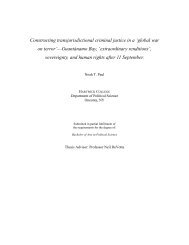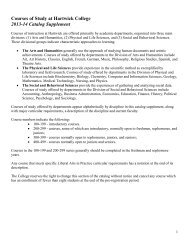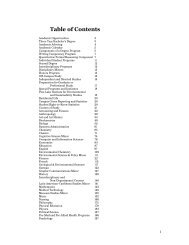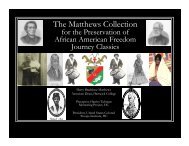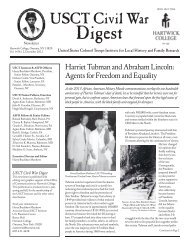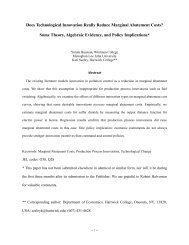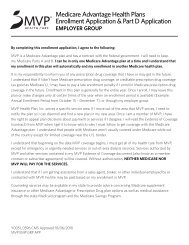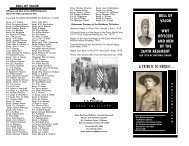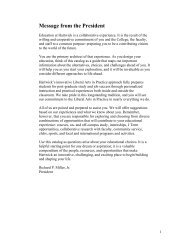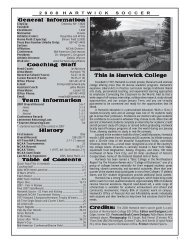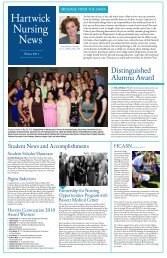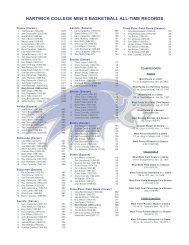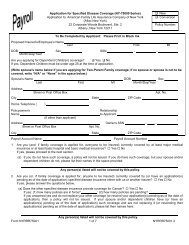Table of Contents - Hartwick College
Table of Contents - Hartwick College
Table of Contents - Hartwick College
You also want an ePaper? Increase the reach of your titles
YUMPU automatically turns print PDFs into web optimized ePapers that Google loves.
participates in interdisciplinary minors, such as Women’s and Gender<br />
Studies, Latin American Studies, Environmental Science and Policy, U. S.<br />
Ethnic Studies, and Museum Studies. Many history majors apply their<br />
growing disciplinary understanding for their work in these minors and<br />
programs. Many students in other disciplines choose to broaden their<br />
academic programs by completing the department’s minor in history.<br />
The Major: Students majoring in history complete a program <strong>of</strong> study<br />
with an emphasis on doing history. A required introductory course in<br />
historical methods (Hist 222) orients the students to the fundamental<br />
skills <strong>of</strong> historical research, while working with primary and secondary<br />
source materials in the archives, online, and in print. The skills acquired<br />
in this course provide the student with the methodological foundation<br />
needed to conduct research in any course that involves historical analysis.<br />
The advanced course in historical methods (Hist 422) prepares advanced<br />
majors for the significant and focused research necessary for their thesis.<br />
The critical skills acquired in these classes, however, can carry over to all<br />
<strong>of</strong> their course work. In addition to the methodological core <strong>of</strong> the major,<br />
students build their understanding from a required introductory survey in<br />
American and in Global histories. These surveys approach the broad<br />
scope <strong>of</strong> their subject from the perspective <strong>of</strong> a particular critical lens to<br />
provide an analytical focus. From this base students deepen their<br />
knowledge in two <strong>of</strong> four areas <strong>of</strong> history: American, Latin American,<br />
European, or Global history. The major culminates with a Senior Seminar<br />
(Hist 489) and Thesis (Hist 490) which is an in-depth research project<br />
built on primary sources and reflective <strong>of</strong> the historical literature on the<br />
subject. Students share research progress in a regularly scheduled<br />
seminar setting, work closely with an individual faculty mentor, and<br />
present their completed work in a public defense. For History majors the<br />
challenge <strong>of</strong> the Senior Thesis is one <strong>of</strong> the most memorable and<br />
satisfying aspects <strong>of</strong> their <strong>Hartwick</strong> education.<br />
Off-Campus Experiences: Students further enrich their academic<br />
programs through a variety <strong>of</strong> learning opportunities <strong>of</strong>fered by the<br />
department outside <strong>of</strong> the classroom. Students can design independent<br />
reading and research projects with faculty approval that explore subjects<br />
outside their regular curriculum or allow them to delve more deeply into<br />
an area <strong>of</strong> particular interest. The department has <strong>of</strong>fered <strong>of</strong>f-campus<br />
programs in France, England, and the Czech Republic. Future programs<br />
may explore Appalachian history, the borderlands <strong>of</strong> the American<br />
Southwest, or the cosmopolitan culture <strong>of</strong> Brazil. Some majors have<br />
pursued semester long programs at universities in France, Greece,<br />
Mexico, Russia, and Spain. Others have pursued individual <strong>of</strong>f-campus<br />
study in January or during the summer under a faculty member’s<br />
guidance. Majors also undertake internships in areas that relate to their<br />
academic field and future career goals. During January Term, history<br />
majors have served as teaching aides, clerks at law firms, or as members<br />
<strong>of</strong> museum staffs. Semester long programs in Washington, DC, Boston,<br />
Philadelphia, or New York also mix classroom experience in urban<br />
universities with internships in Congress or other institutions in the<br />
142



